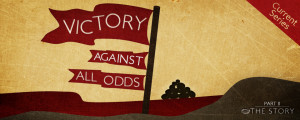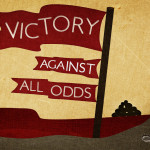Apr 26, 2015
The Faith of a Foreign Woman
Series: Victory Against All Odds
 This week we are in chapter 9 of The Story. If a video camera was rolling
through this chapter you would find many different expressions:
anticipation and joy, disillusionment and disappointment, anger and
bitterness. The story takes places during the period of the Judges, but
it’s not about a judge and really doesn’t appear to be about the nation of
Israel. On the surface it doesn’t seem to make much sense as a book in the
Bible it appears to be a story of a random family with a husband named
Elimelech and his wife named Naomi. It’s not long before a couple of sons
are born, and the story seems to be going as planned. But then a famine
strikes, and this family is forced to move to the land of Moab. Once they
arrive, the two sons marry two Moabite women Ruth and Orpah. But it’s not
long before Elimelech and his two sons die, leaving three widows.
This week we are in chapter 9 of The Story. If a video camera was rolling
through this chapter you would find many different expressions:
anticipation and joy, disillusionment and disappointment, anger and
bitterness. The story takes places during the period of the Judges, but
it’s not about a judge and really doesn’t appear to be about the nation of
Israel. On the surface it doesn’t seem to make much sense as a book in the
Bible it appears to be a story of a random family with a husband named
Elimelech and his wife named Naomi. It’s not long before a couple of sons
are born, and the story seems to be going as planned. But then a famine
strikes, and this family is forced to move to the land of Moab. Once they
arrive, the two sons marry two Moabite women Ruth and Orpah. But it’s not
long before Elimelech and his two sons die, leaving three widows.WatchNotesDownloadDateTitle
- Apr 26, 2015The Faith of a Foreign WomanApr 26, 2015The Faith of a Foreign WomanSeries: Victory Against All Odds
 This week we are in chapter 9 of The Story. If a video camera was rolling
through this chapter you would find many different expressions:
anticipation and joy, disillusionment and disappointment, anger and
bitterness. The story takes places during the period of the Judges, but
it’s not about a judge and really doesn’t appear to be about the nation of
Israel. On the surface it doesn’t seem to make much sense as a book in the
Bible it appears to be a story of a random family with a husband named
Elimelech and his wife named Naomi. It’s not long before a couple of sons
are born, and the story seems to be going as planned. But then a famine
strikes, and this family is forced to move to the land of Moab. Once they
arrive, the two sons marry two Moabite women Ruth and Orpah. But it’s not
long before Elimelech and his two sons die, leaving three widows.
This week we are in chapter 9 of The Story. If a video camera was rolling
through this chapter you would find many different expressions:
anticipation and joy, disillusionment and disappointment, anger and
bitterness. The story takes places during the period of the Judges, but
it’s not about a judge and really doesn’t appear to be about the nation of
Israel. On the surface it doesn’t seem to make much sense as a book in the
Bible it appears to be a story of a random family with a husband named
Elimelech and his wife named Naomi. It’s not long before a couple of sons
are born, and the story seems to be going as planned. But then a famine
strikes, and this family is forced to move to the land of Moab. Once they
arrive, the two sons marry two Moabite women Ruth and Orpah. But it’s not
long before Elimelech and his two sons die, leaving three widows. - Apr 19, 2015A Few Good Men and WomenApr 19, 2015A Few Good Men and WomenSeries: Victory Against All OddsThe Bible says that the nation of Israel followed God faithfully throughout the life of Joshua and the elders who succeeded him. But when that generation of leaders died out, the Israelites spent the next 400 years in a cycle: disobedience, punishment, repentance, and deliverance (Judges 2:10). So the new generation began to worship the pagan gods of their new land, until God finally used those pagan nations to punish them. God would punish them by allowing them to be oppressed by one of the neighboring tribal nations. They would cry out to God in repentance and beg for deliverance. During those times of punishment, God would raise up Judges political, military, and spiritual leaders to lead Israel back to Himself. There were several Judges, but a few of them capture the cycle of the entire 400-year period.
- Apr 12, 2015The Battle BeginsApr 12, 2015The Battle BeginsSeries: Victory Against All OddsWe often try and avoid situations where courage is required. We prefer to play it safe, to avoid the risks, to stay within our boundaries. In the swimming pool of life, most of us try and stay in the shallow end. But there are moments—defining moments—in our stories where we will be called upon to be men and women of courage. They may not be as dramatic as a shielding your children from a tornado or running for help in a life and death situation, but we will all have moments that will test our courage. In chapter 7 we read about Joshua who was a man of great courage. He is leading Israel back to the Promised Land that they refused to enter 40 years earlier (Num. 13:27), and in Joshua 1:1-7, as God prepares Joshua to lead the charge, He urges him to "be strong and very courageous (v. 7)."
- Mar 29, 2015WanderingsMar 29, 2015WanderingsSeries: Victory Against All Odds
 Once Israel was delivered out of Egypt, the plan was to get to the Promised
Land—a land "flowing with milk and honey"—which means it was a beautiful,
fertile, prosperous place. And there was a route they could have taken from
Egypt to Canaan that Isaiah calls "the way of the sea" (Isaiah 9:1) because
it followed the Mediterranean Sea. That would have been the direct route.
Here are few things about this direct route: It was the shortest distance,
the most scenic route, and the most popularly traveled. But God doesn't
take them on the Direct Route. Instead, Israel wanders in the wilderness
for 40 years. Let’s define "wandering" this way: Living in the space
between where I started and where I want to be. The question is this: How
do you live in the space between?
Once Israel was delivered out of Egypt, the plan was to get to the Promised
Land—a land "flowing with milk and honey"—which means it was a beautiful,
fertile, prosperous place. And there was a route they could have taken from
Egypt to Canaan that Isaiah calls "the way of the sea" (Isaiah 9:1) because
it followed the Mediterranean Sea. That would have been the direct route.
Here are few things about this direct route: It was the shortest distance,
the most scenic route, and the most popularly traveled. But God doesn't
take them on the Direct Route. Instead, Israel wanders in the wilderness
for 40 years. Let’s define "wandering" this way: Living in the space
between where I started and where I want to be. The question is this: How
do you live in the space between?
